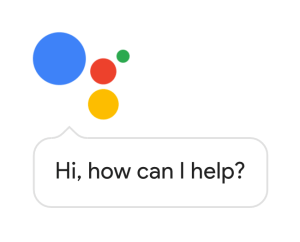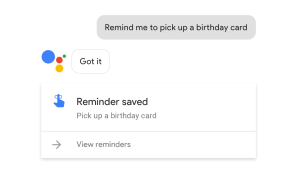Google continues its march to expand its place in the mobile ecosystem, anchored by the fact that its Android OS is by far the most ubiquitous smartphone platform in the world. Today, the company announced that it would be rolling out Google Assistant, its conversational search and AI-based personal helper (and answer to Apple’s Siri and Amazon’s Alexa), to smartphones running Google Play services on unforked versions of Android 7.0 (Nougat) and Android 6.0 (Marshmallow), including Android-forward phones like the Nexus and new devices like the LG G6.
Google said Google Assistant will begin rolling out this week to users in the U.S., followed by English speakers in Australia, Canada and the United Kingdom; and German speakers in Germany.
No detail on what comes after today’s language roll outs, but this puts it on par with Amazon’s Alexa, which is also currently available in just English and German. “We’ll continue to add more languages over the coming year,” Gummi Hafsteinsson, product lead for the Google Assistant, writes in a blog post.
Significantly, this the first step into the wider smartphone ecosystem at large for Google Assistant — not just the Android maker’s answer to Apple’s Siri and Amazon’s Alexa, but a big step up from its older Google Now search app, with third-party service integrations (“Actions”) and a bot-like intelligent, conversational interface.
 Users will be able to access the service with the Google’s now-famous wake-up, “OK, Google” to do things like take a photo, set and access calendar items, ask for translations for phrases, get directions to places, browse your photos, check the weather, operate smart-home devices, and more.
Users will be able to access the service with the Google’s now-famous wake-up, “OK, Google” to do things like take a photo, set and access calendar items, ask for translations for phrases, get directions to places, browse your photos, check the weather, operate smart-home devices, and more.
This opens the door to Google Assistant as a native app experience to “hundreds of millions” of devices, Hafsteinsson notes. It’s not a totally ubiquitous rollout, though. According to Google, today just under 31 percent of Android devices in use are using Marshmallow. And Nougat, both 7.0 and 7.1, account for only 1.2 percent. (Earlier iterations KitKat and Lollipop, which are not getting Google Assistant today, account for over half of all Android devices in use.)
With Google announcing the news on the eve of the big Mobile World Congress event in Barcelona, expect to see Google Assistant appearing from this week on new (and older!) devices from HTC, Huawei, HMD/Nokia, Samsung and Sony.
 Up to now, Google Assistant’s rollout has been limited to a selection of Google-branded hardware and software: Google’s chat app Allo and Google’s smart-home device Google Home (Assistant has been a feature in these since May of last year when it was first unveiled); Android Wear; Google’s Pixel smartphones; and (soon but not quite yet) to Android car and TV implementations (led by the Nvidia Shield).
Up to now, Google Assistant’s rollout has been limited to a selection of Google-branded hardware and software: Google’s chat app Allo and Google’s smart-home device Google Home (Assistant has been a feature in these since May of last year when it was first unveiled); Android Wear; Google’s Pixel smartphones; and (soon but not quite yet) to Android car and TV implementations (led by the Nvidia Shield).
As we noted when the Pixel was launched in October, the fact that Google Assistant was not baked yet into Android itself was a noticeable sticking point.
And now that it will be rolled out as part of Marshmallow and Nougat, we will get a chance to see just how robust and used it might be — and how much this expansion will help feed the machine learning that powers Google Assistant, to see how it develops.
Why the delay? Possibly for a few reasons. First, Android device fragmentation and assuring the app would work as expected in multiple environments, and equally a slower rollout to make sure it’s working as planned.
Second, it gave Google a shot to help promote certain products by baking it in earlier and giving them a degree of exclusivity on the feature as a result.
Third, the timing: tomorrow is the start of a big mobile event where a wave of new smartphones is getting announced all at once, and with all of them already being built on Android, it gives Google another angle for exposure (and those devices baking it in another feature to talk about).
There may be another narrative that the Google Assistant taps into:
If Smartphone 1.0 was the rise of more powerful mobile handsets that took advantage of the growth of data networks to provide users with more services beyond simple voice and text (think: early Nokia devices and BlackBerry); and Smartphone 2.0 marked the entrance of Apple and Google into the picture, and the rise of ecosystems that bypassed carriers and brought in many apps, arsenals for winning the platform wars (or jumping from a “burning platform,” if you were less lucky); then you could argue that now we’re entering a phase of Smartphone 3.0 — where the platform winners, also competing with hopefuls who grew very strong in mobile during 2.0 but never controlled the platform (see Amazon, Facebook and possibly Snap) are building out ever-more intelligent services to tie in users deeper into their bigger business strategies.
Google Assistant, in that regard, was a must-do from Google and a smart move to bring to market right here and right now — even though it appears to be something that Google has been planning for at least five years already. (Recall this scoop from Alexia in 2012 about a project in the works called Google Assistant.)
It’s not the only effort from the company to raise the bar on the kinds of services that are already being offered to users, and to tie them in with more of an ecosystem approach with brands and other developers.
On Friday — also timed to coincide with MWC — Google announced a major expansion of its RCS initiative, and a rebranding of its basic Android SMS app to Android Messages, to usher in a messaging experience that is much more dynamic, interactive and also competitive with the wave of other messaging apps out there. Part of that expansion? A new partner program to work with developers and brands to build new, interactive customer services for Android Messages.































Comment